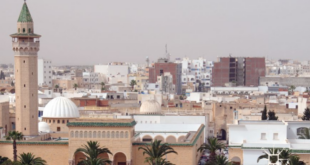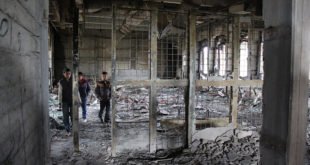Nart Bouran is one of the most strikingly professional people in the Arab satellite television news business. He joined Abu Dhabi TV six months ago after a two-year stint as DG at Jordan TV. Before that Bouran was with APTN in London as regional executive for the Middle East and North Africa for one year and before that with Reuters TV as Middle East regional editor for five years. That's where we first met. Bouran's boss, Ali Al Ahmed, refers to Abu Dhabi TV's build-up of capacity to go all-news on sudden notice to a clandestine effort may months prior to the war to build up human and technical resources. Bouran is the Stealth Bomber of that clandestine buildup.
Schleifer: Everybody is saying that ADTV is neck and neck, if not the winner so far (less than a week into the war) in the Arab satellite sweeps for news coverage picked up by global television-that is if you can get past all of the attention being paid to today's graphic photos from Al Jazeera of dead and captured American and British soldiers.
Bouran: We ran the same pictures but we make sure the viewer gets the story with all details but maintaining certain standards. You get the idea, the picture, the information without pushing the limits and while still maintaining a certain ethical standard. For example, when we visit residential areas that have been hit, we show it's been hit, show the people, show the wounded in the hospitals, show all casualties but you apply the same kind of ethical standards-we don't editorialize, we maintain a line of presenting facts, without our editorializing or allowing the presenter or reporter to editorialize. Giving information about what we are seeing and not how we feel about what we are seeing- that holds true everywhere and we drill that into editors and correspondents.
We are not perfect, we are running a large operation with a large number of editors and correspondents, but if there is a mistake and this policy is not applied, we try to rectify it and make sure it doesn't happen again.
Schleifer: What sort of feed-back are you getting from your viewers? I know professionals appreciate the quality of your coverage, but in particular they appreciate the quality of the pictures.
Bouran: We have the right number and type of journalists and we are in all of the right places. That involved a lot of planning and studying. Look at the map of Iraq, we are at every single border point, in every country adjacent to Iraq, both on the border and in the capital as well as being in Baghdad, all the major cities. We have three correspondents in Kurdish Iraq and we have three correspondents moving around southern Iraq. The fourth crew was inside Basra and we will try and send them to Najaf or Kabala.
About in total 22 reporters dedicated to this coverage and that includes the regular otherwise not engaged bureaus like Cairo and Jerusalem and Beirut. We have two correspondents in Iran-a local who works for us and one we sent in.
Schleifer: Generally I have noticed a lack of interest on the part of most Arab channels, be they satellite or primarily national channels, in interviewing members of the Iraqi Opposition be they in exile or clustered in the Anglo-American protected area of northern Iraq that is controlled by the Iraqi Kurdish parties. Have you interviewed opposition leaders or spokesmen?
Bouran: We did before the fighting. Now it's a war story. Where the opposition is on a war footing, like the Kurds, or the Badr brigade in Iran, we talk with them. But once they become a story, as a political force, we will cover them.
Schleifer: What about feed back?
Bouran: In general, people are very impressed by our coverage and in particular by what we are able to contribute to global media coverage. Everybody is impressed when they see our "Abu Dhabi Exclusive" credit on BBC, CNN, and all the major news organizations all over the world. Both television news agencies (APTN and Reuters) are using our stuff.
Schleifer: So that may be why I get this impression in talking with viewers that Abu Dhabi's picture is stronger than the reporting, because they are seeing the pictures everywhere, much of them courtesy of the agencies. So you have all these channels taking the picture from you but they do their own voice- overs.
Bouran: Look, newspapers in Kuwait, Saudi Arabia, and Lebanon are commenting on our coverage-they are both surprised and pleased. Well, our biggest success has been our ability to switch to a 24-hour news operation, on the first day of the war, with gradual increments in the days preceding the war because we could see where it was going and we knew where we wanted to go. We had it all planned. None of it was improvised or done on the spur of the moment; it was all due to planning, starting months ago. We knew six months ago something was going to happen. We didn't know exactly what it would be, but we knew we would have to plan for it. We all expected a war; we were hoping it wouldn't happen, but we had to be prepared for it. And that's why the whole organization pulled together in preparation for it. The backbone is the news center but I think our success has been the ability to bring in all the departments-the technology people and programming-to pitch in.
Schleifer: What technology are you using?
Bouran: In all those positions I mentioned we either have a Satellite News Gathering facility (SNG) truck (10 SNGs are committed to Iraq and the neighboring states) or video phones. So every correspondent can go live and can get back to us from the field.
We are a big organization but everyone knew that once we went to 24 hours, the News Center becomes the backbone that every department contributes to and supports. We identified qualified people in other departments that we pulled in just before the war broke out-some we use in the field, some take different positions on the desk. We went to two shifts and now we are trying to go to three.
 Arab Media & Society The Arab Media Hub
Arab Media & Society The Arab Media Hub




